‘No Justice, No Profit’ as not spending becomes weapon for justice
By Raychelle Muhammad -The Final Call- | Last updated: Nov 14, 2017 - 1:08:52 PMWhat's your opinion on this article?
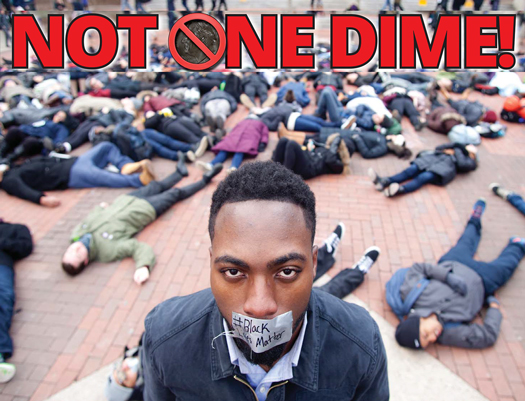
Protesters demonstrate below as shoppers watch from above inside Chesterfield Mall Friday, Nov. 28, 2014, in Chesterfield, Mo. The crowd disrupted holiday shopping at several locations on ‘Black Friday’ amid a protest triggered by a grand jury's decision not to indict the police officer who fatally shot Michael Brown in nearby Ferguson. Photo: AP/Wide World photos
|
Thanksgiving weekend has traditionally been the kickoff to the holiday shopping season. But in recent years, the ongoing fight for justice in the face of rampant police brutality has led to economic boycotts across the country.
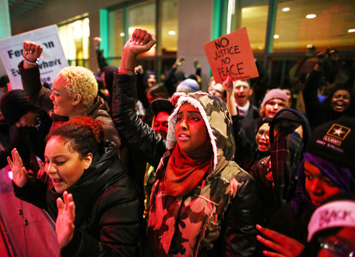
Protestors gather outside of the Westlake Center in Seattle on Nov. 28, 2014, to protest the Ferguson grand jury decision. More than 200 protesters, some chanting "Black Lives Matter!" tried to disrupt Black Friday shopping and downtown Seattle's traditional Christmas tree lighting ceremony. Police turned out in force, arresting five people, and a downtown mall closedearly. Photos: AP/Wide World photos
|
While the impact and effectiveness of economic boycotts have been widely debated, poor sales this holiday season could cripple struggling retailers. In October 2017, the National Retail Federation forecast an increase of 3.6 to 4 percent in sales over last year which translates to between $678.75 billion to $682 billion, up from $655.8 billion last year.
While encouraging, the news of a potentially profitable fourth quarter won’t be enough to make up for deficits many companies have accumulated all year long.
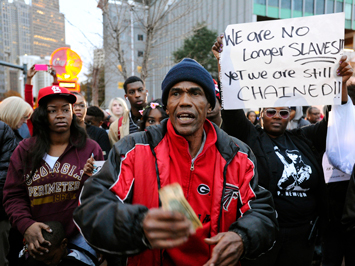
Ricky Hawkins tells a group of protesters at the Underground Atlanta entertainment complex to boycott Black Friday sales one day after the Ferguson, Missouri, grand jury decision not to indict police officer Darren Wilson in the shooting of unarmed 18-year-old Mike Brown, on Nov. 25, 2014, in Atlanta.
|
With Black people now being encouraged to use their estimated $1.2 trillion in spending power as a weapon against injustice and a tool to support Black-owned businesses, the effects of continued economic boycotts could be insurmountable.
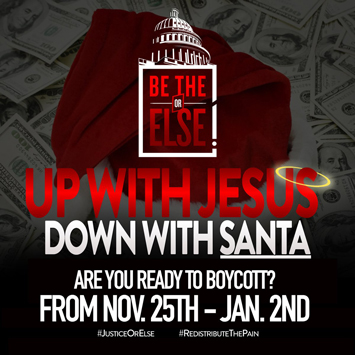
|
In 2015, the Honorable Minister Louis Farrakhan called for an economic boycott of Christmas during his address at the 20-year anniversary of the historic Million Man March. The Black community had suffered painful instances of unarmed men and women being gunned down by police officers across the country. The families of those victims generally received no justice and the cops were rarely charged with crimes. Sending a message to police officials and lawmakers by demanding “Justice Or Else!” Minister Farrakhan said that if Black lives don’t matter, then neither should their Black dollars.
Minister Farrakhan’s “Up With Jesus, Down With Santa” campaign aims to shift the focus from the commercialism of Christmas back to a spiritual one while emphasizing cooperative economics.
“We intend to boycott Christmas but not Jesus,” Minister Farrakhan said. “We choose not to spend dollars on Black Friday, Black Saturday, Black Sunday, Black Monday. We are not going to spend our money for the rest of the year with those companies that we traditionally spent our money on.”
Continuing in that spirit, activists around the country are galvanizing their efforts to #BoycottBlackFriday and #RedistributeThePain. To demand justice for the brutal killing of Laquan McDonald by former Chicago police officer Jason Van Dyke, the Chicago Alliance Against Racial and Political Repression has planned a “Day of Defiance.” On Nov. 24, they will once again protest along the Magnificent Mile.
Co-Chairs of CAARPR’s Stop Police Crimes Organizing Committee told The Final Call the arrest of the officer who killed teenager McDonald as well as the firing of key members of Chicago law enforcement happened partly because of Black Friday protests the last two years.
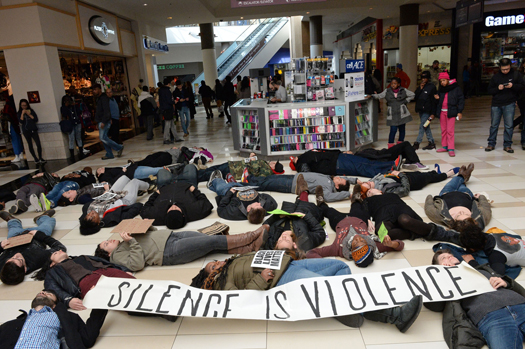
Protestors stage a "die-in" to chant "Black lives matter" and protest the recent grand jury decisions from Ferguson, Mo., and Staten Island in New York City during a demonstration at Crossgates Mall in Guilderland, N.Y. on Dec. 20, 2014, one of the busiest holiday shopping days of the year. Photo: AP/Wide World photos
|
“First of all, there sits in the Magnificent Mile businesses, banks and financial institutions that make up and control the economic pulse of this city and who, therefore, have their hands on the political levers of this city. They help finance the political campaigns of the mayor and city council members. They are the behind-the-scenes manipulators of City Hall. They are the real powers-that-be,” organizer Frank Chapman said. “Therefore, we are organizing this boycott with a clear message and objective summed up in the slogan: ‘No Justice, No Profits!’ And what is justice for us? It’s about getting justice for Laquan McDonald by making sure that Jason Van Dyke is convicted.”
Co-chair Jazmine Salas said the power of an economic boycott should not be underestimated. In young McDonald’s case, the city of Chicago had just covered up a “modern-day lynching” and was attempting to “roll out the red carpet for Black Friday.” Activists took to the streets to say, “no more,” she said.
“We successfully blocked stores and impacted sales, and the movement for Laquan led to the arrest of his killer and the firing of the Chicago police superintendent and the state’s attorney,” Ms. Salas said.
“Economic boycotts work because we’ve seen their success in our work and we’ve learned from other movements, like the Montgomery Bus Boycott and the Farmworker Boycotts led by Ceasar Chavez,” Ms. Salas continued. “When you organize oppressed people to act for justice and disrupt the daily functioning of the system, you can have a major impact. This year, we plan on raising awareness about the Jason Van Dyke trial and letting the mayor and the criminal justice system know that we haven’t forgotten about the gruesome murder—the people are still watching.”
In St. Louis, outrage over the Sept. 15 acquittal of former police officer Jason Stockley in the 2011 fatal shooting of Anthony Lamar Smith led to ongoing protests. Fox 2 News reported that overtime pay owed to police officers from just the first 10 days of patrolling after the verdict was a whopping $2.9 million. Mayor Lyda Krewson has said mounting expenses are having an adverse effect on the city’s budget. The city of St. Louis is already feeling the financial pain of injustice.

|
But community activists are calling for an economic boycott to turn up the heat on city officials. Pastor Dinah Tatman, who is the CEO and founder of Greater New Vision Ministries Inc., is a co-convener of the “No Justice, No Profit” campaign discouraging residents from shopping this holiday season.
“As of today, Thursday, November 2, 2017, we will be withdrawing our financial support from any entities that do not respect us or our purchasing power. Instead we will be redistributing our monies to support and build our own businesses, schools and communities,” Pastor Tatman said at a press conference announcing the boycott.
“We are covering for our young protest family. We support what they are doing, and we believe as a collective family that we will get justice or else. Therein lies the tools that no one can take from us, our money. And so we are now taking our money and we are investing what we have invested in others and invest in ourselves, starting with Christmas. Because the whole boycott is perpetual and that’s when most of us spend most of our money and the retailers depend on us to make their goals. So we say, this year, next year and however long it takes, we will no longer support you to suppress us,” Pastor Tatman continued.
Nation of Islam St. Louis representative Student Minister Donald Muhammad sees firsthand the ripple effect that the call for economic boycotts and reinvestment in the Black community are having.
“There’s been a movement started with the clergy and everywhere I go everyone is talking about an economic boycott. But I’m so grateful to see the words of the Honorable Minister Farrakhan come to pass. He called for an economic boycott of the Christmas season on October 10, 2015. He resurrected the words of Martin Luther King, to ‘redistribute the pain.’ The Minister said that the people are tired of injustice, and it’s in the atmosphere that injustice is coming to an end,” said Mr. Muhammad.
The “No Justice, No Profit” boycott includes Target, US Bank, Burger King, Shell, grocery chain Schnucks, Gap Inc., Goldman Sachs, and the St. Louis Galleria Mall. Instead of shopping at these businesses, organizers are directing supporters to www.nojusticenoprofit.us for a list of Black banks, websites, and storefronts to patronize instead.
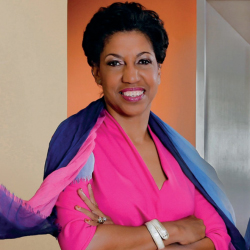
President and COO of OneUnited Teri Williams
|
President and COO of OneUnited Teri Williams told CNBC that moving money into Black banks is critical to building wealth. Ms. Williams said that wealth is the gateway to political power for the underserved and the underrepresented.
“There is an awakening for the Black community to utilize our $1.2 trillion in annual spending power to create jobs and build wealth in our community,” Ms. Williams said. “People aren’t saying don’t bank [as a form of protest], so banking Black is not a loss to the financial industry. It’s merely a distributional change from one institution to another.”
J.A. Salaam contributed to this article from St. Louis.
INSIDE STORIES AND REVIEWS
-
-
About Harriett ... and the Negro Hollywood Road Show
By Rabiah Muhammad, Guest Columnist » Full Story -
Skepticism greets Jay-Z, NFL talk of inspiring change
By Bryan 18X Crawford and Richard B. Muhammad The Final Call Newspaper @TheFinalCall » Full Story -
The painful problem of Black girls and suicide
By Charlene Muhammad -National Correspondent- » Full Story -
Exploitation of Innocence - Report: Perceptions, policies hurting Black girls
By Charlene Muhammad -National Correspondent- » Full Story -
Big Ballin: Big ideas fuel a father’s Big Baller Brand and brash business sense
By Bryan Crawford -Contributing Writer- » Full Story






 Click Here Stay Connected!
Click Here Stay Connected!








